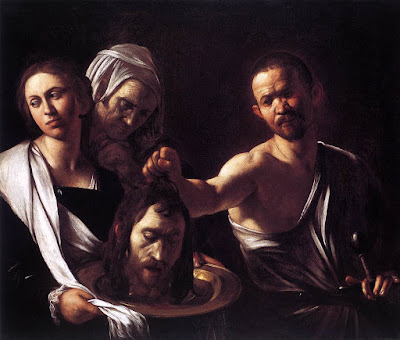on their journey, someone said to him,
“I will follow you wherever you go.”
We get so excited when we see that all that Jesus is doing. We have all of this initial zeal. We will follow him wherever he goes. Except, maybe to the cross. We didn't really realize he is going there. We didn't realize that this isn't going to be simply the royal parade of the king. It is not just the red carpet rolled out toward the throne. The journey isn't easy. The Son of Man himself has nowhere to rest his head.
As we first hear about this we don't realize the full implications. We think approach it like our newest and most exciting hobby. We think that there will still be room for everything we used to do. We think it is up to us to divide up our time. Maybe we'll give Jesus seventy-five percent of our time but reserve twenty-five percent for "the other important things." Yet even the most important "other things" can't take precedence over following Jesus. It is no longer up to us to divide our time at all. It isn't our choice whether or not there is room for anything from our old life. All of this is up to him.
Let the dead bury their dead.
But you, go and proclaim the Kingdom of God.
Jesus has a greater claim on us than even Elijah has on Elisha.
And he left the oxen and ran after Elijah and said, “Let me kiss my father and my mother, and then I will follow you.” And he said to him, “Go back again, for what have I done to you?” (1 Kin. 19:20)
We must simply follow him and leave the rest in his hands. He is the one thing necessary. We must desire his mission with the same heart with which Nehemiah desires to see Jerusalem rebuilt.
How could I not look sad
when the city where my ancestors are buried lies in ruins,
and its gates have been eaten out by fire?”
The desire for the kingdom of Jesus to rise in our midst must be even stronger than the desire of Nehemiah to rebuild the city of his ancestors' graves. We realize that this desire must go deep in us. It must be so genuine in our hearts that to see it unfulfilled is a source of sadness for us. Only then do we respond wholeheartedly when Jesus says, "Follow me."
May my tongue cleave to my palate
if I remember you not,
If I place not Jerusalem
ahead of my joy.
Jesus is leading his people back from the exile of sin and death just as the psalmist was captive in Babylon. We cannot fully sing the songs of Zion while the exile persists. But Jesus is leading us out! Let us look to him as he teaches us to sing a new song to the LORD. Let us follow him recklessly with no regard to whatever we may have to leave behind. When we have this attitude we see the kingdom built even in our midst as the land of our exile is transformed into the kingdom.
The king granted my requests,
for the favoring hand of my God was upon me.
His hand remains upon us until we finally hear the angel blow his trumpet and loud voices in the heaven, saying "The kingdom of the world has become the kingdom of our Lord and of his Christ, and he shall reign forever and ever" (cf. Rev. 11:15).
























